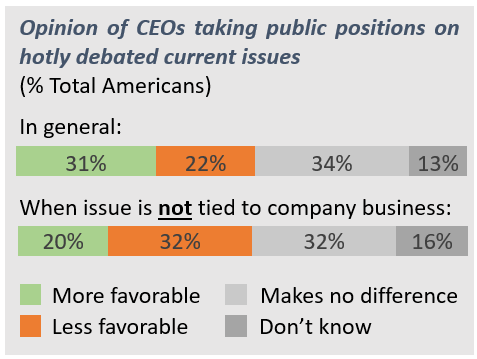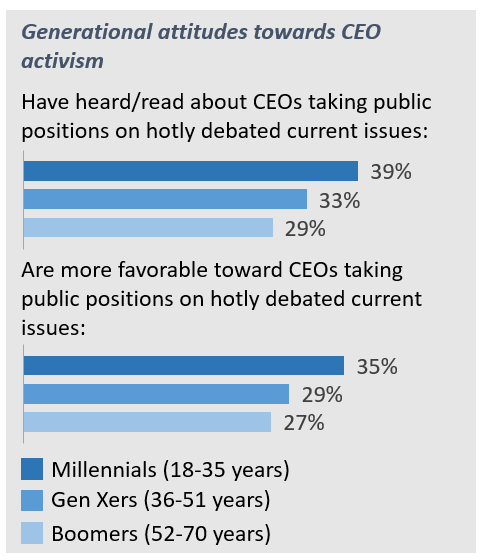Does CEO activism affect firms?
Executive Factsheet
When CEOs take a stand on issues of public concern, this has repercussions on the image of the company they are leading. Whether CEO activism is rather valued or disapproved depends, inter alia, on the age of the audience, and on the degree to which the issue is related to the firm’s activity.
Download the PDF: Does CEO activism affect firms?
What is “CEO activism”? (1) (2)
One speaks of “CEO activism” when one or several chief executives speak out on social, environmental, or political issues that are not necessarily related to their business.
The subjects on which CEOs can take a stand are manifold, including such diverse matters as climate change, gender equality, immigration policies, racial discriminations, and LGBT rights. Prominent instances of CEO activism include:
- Lloyd Blankfein, the CEO of Goldman Sachs, publicly supporting same-sex marriage as of 2012;
- Howard Schultz, the CEO of Starbucks, leading a campaign against racial discrimination in 2015;
- Darren Wood, the CEO of ExxonMobil, calling on U.S. President Donald Trump to remain in the international Paris Climate in 2017.
When did CEO activism emerge? (2)
CEO activism is a new phenomenon: Until recently, it was rare for corporate leaders to take a public stand on issues of public concern.
Speaking out on topics such as the ones mentioned above was left to social activists and political players.
Since the mid-2010s, though, CEO activism gained momentum and received increased media attention. Donald Trump’s election to the presidency of the U.S. functioned as a catalyst in this regard. While the phenomenon has largely remained confined to the U.S. for now, experts suspect that it will spread and develop into a global movement in the years to come.
How does CEO activism affect firms?
In recent years, CEO activism has received increased attention within the management science community. The reason for this is that it has implications for the firm in question: When a CEO takes a public stand on a societal issue, this de facto involves the company she is in charge of.
This raises the question of whether and under what conditions CEO can be beneficial or harmful for the firm at issue.
CEO activism is a controversial practice: When a CEO takes a stand on a public concern, this generally triggers both favorable and disapproving reactions among the public. (1)
Academic research and survey results suggests that whether the “net balance” in terms of impact on the firm’s image is positive or negative depends on various factors, and in particular on:
- The extent to which the issue is perceived to be related to the firm’s activity. According to a recent survey, the number of Americans who are generally favorable to CEO activism exceeds the number of those being unfavorable to it (31% vs. 22%, the rest being neutral or undecided). However, if the issue on which the CEO speaks out is considered to be unrelated to the firm’s business activity, it is the other way round (20% vs. 32%).

Source: KRC Research Report, 2016. The Dawn of CEO Activism
- The age of the audience: So-called “millennials” are both more aware of (39% having heard about CEOs taking public positions on debated issues vs. 29% of the more-than-52-year-olds), and more favorable to (35% vs. 27%) CEO activism than their elders.

Source: KRC Research Report, 2016. The Dawn of CEO Activism
- The alignment of the CEO’s intervention to the political orientation of the audience. CEO activism also increases the risk that the firm receives media criticism, if it concurrently engages in socially contested practices such as paying large executive compensations: A recent research study shows that when a company has low philanthropic involvement, CEO overcompensation will only be reported on negatively in 14% of news articles, instead of 37% in cases of high philanthropic involvement.(3)
REFERENCES
2- Gaines-Ross, L. (2017). What CEO Activism Looks Like in the Trump Era. Harvard Business Review. Digital article. Accessed July 17, 2019. 3- Vergne, J. P., Wernicke, G., & Brenner, S. (2018). Signal incongruence and its consequences: a study of media disapproval and CEO overcompensation. Organization Science, 29(5), 796-817. |